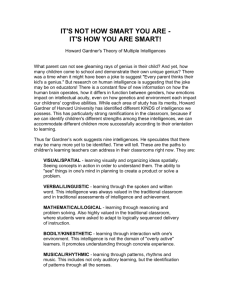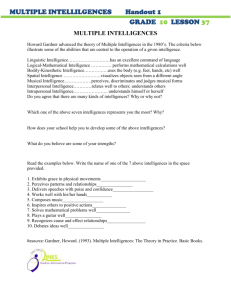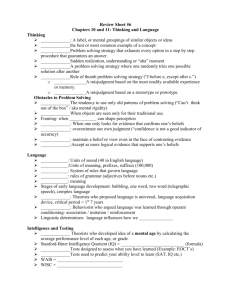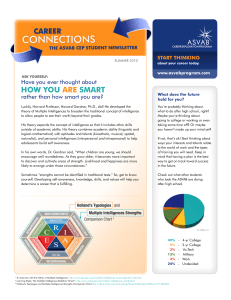A Quick Overview of the Idea of Multiple Intelligences
advertisement
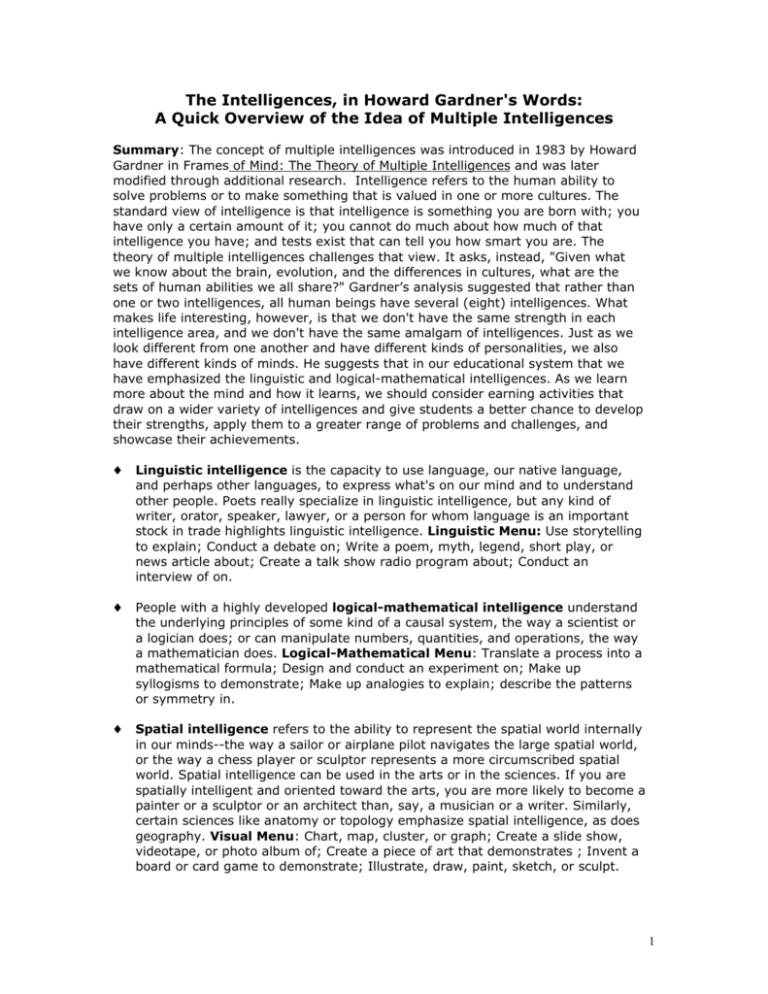
The Intelligences, in Howard Gardner's Words: A Quick Overview of the Idea of Multiple Intelligences Summary: The concept of multiple intelligences was introduced in 1983 by Howard Gardner in Frames of Mind: The Theory of Multiple Intelligences and was later modified through additional research. Intelligence refers to the human ability to solve problems or to make something that is valued in one or more cultures. The standard view of intelligence is that intelligence is something you are born with; you have only a certain amount of it; you cannot do much about how much of that intelligence you have; and tests exist that can tell you how smart you are. The theory of multiple intelligences challenges that view. It asks, instead, "Given what we know about the brain, evolution, and the differences in cultures, what are the sets of human abilities we all share?" Gardner’s analysis suggested that rather than one or two intelligences, all human beings have several (eight) intelligences. What makes life interesting, however, is that we don't have the same strength in each intelligence area, and we don't have the same amalgam of intelligences. Just as we look different from one another and have different kinds of personalities, we also have different kinds of minds. He suggests that in our educational system that we have emphasized the linguistic and logical-mathematical intelligences. As we learn more about the mind and how it learns, we should consider earning activities that draw on a wider variety of intelligences and give students a better chance to develop their strengths, apply them to a greater range of problems and challenges, and showcase their achievements. ® Linguistic intelligence is the capacity to use language, our native language, and perhaps other languages, to express what's on our mind and to understand other people. Poets really specialize in linguistic intelligence, but any kind of writer, orator, speaker, lawyer, or a person for whom language is an important stock in trade highlights linguistic intelligence. Linguistic Menu: Use storytelling to explain; Conduct a debate on; Write a poem, myth, legend, short play, or news article about; Create a talk show radio program about; Conduct an interview of on. ® People with a highly developed logical-mathematical intelligence understand the underlying principles of some kind of a causal system, the way a scientist or a logician does; or can manipulate numbers, quantities, and operations, the way a mathematician does. Logical-Mathematical Menu: Translate a process into a mathematical formula; Design and conduct an experiment on; Make up syllogisms to demonstrate; Make up analogies to explain; describe the patterns or symmetry in. ® Spatial intelligence refers to the ability to represent the spatial world internally in our minds--the way a sailor or airplane pilot navigates the large spatial world, or the way a chess player or sculptor represents a more circumscribed spatial world. Spatial intelligence can be used in the arts or in the sciences. If you are spatially intelligent and oriented toward the arts, you are more likely to become a painter or a sculptor or an architect than, say, a musician or a writer. Similarly, certain sciences like anatomy or topology emphasize spatial intelligence, as does geography. Visual Menu: Chart, map, cluster, or graph; Create a slide show, videotape, or photo album of; Create a piece of art that demonstrates ; Invent a board or card game to demonstrate; Illustrate, draw, paint, sketch, or sculpt. 1 ® Bodily kinesthetic intelligence is the capacity to use your whole body or parts of your body--your hand, your fingers, your arms--to solve a problem, make something, or put on some kind of a production. The most evident examples are people in athletics or the performing arts, particularly dance or acting. BodilyKinesthetic Menu: Create a movement or sequence of movements to explain; Make task or puzzle cards for; Build or construct a; Plan and attend a field trip that will; Bring hands-on materials to demonstrate. ® Musical intelligence is the capacity to think in music, to be able to hear patterns, recognize them, remember them, and perhaps manipulate them. People who have a strong musical intelligence don't just remember music easily--they can't get it out of their minds, it's so omnipresent. Now, some people will say, "Yes, music is important, but it's a talent, not an intelligence." And I say, "Fine, let's call it a talent." But, then we have to leave the word intelligent out of all discussions of human abilities. You know, Mozart was damned smart! Musical Menu: Give a presentation with appropriate musical accompaniment on; Sing a rap or song that explains; Indicate the rhythmical patterns in; Explain how the music of a song is similar to; Make an instrument and use it to demonstrate. ® Interpersonal intelligence is understanding other people. It's an ability we all need, but is at a premium if you are a teacher, clinician, salesperson, or politician. Anybody who deals with other people has to be skilled in the interpersonal sphere. Interpersonal Menu: Conduct a meeting to address; Use social skills to learn about; Participate in a service project to; Teach someone about; Practice giving and receiving feedback on; Use technology to. ® Intrapersonal intelligence refers to having an understanding of yourself, of knowing who you are, what you can do, what you want to do, how you react to things, which things to avoid, and which things to gravitate toward. We are drawn to people who have a good understanding of themselves because those people tend not to screw up. They tend to know what they can do. They tend to know what they can't do. And they tend to know where to go if they need help. Intrapersonal Menu: Describe qualities you possess that will help you successfully complete; Set and pursue a goal to; Describe one of your personal values about; Write a journal entry on; Assess your own work in. ® Naturalist intelligence designates the human ability to discriminate among living things (plants, animals) as well as sensitivity to other features of the natural world (clouds, rock configurations). This ability was clearly of value in our evolutionary past as hunters, gatherers, and farmers; it continues to be central in such roles as botanist or chef. I also speculate that much of our consumer society exploits the naturalist intelligences, which can be mobilized in the discrimination among cars, sneakers, kinds of makeup, and the like. The kind of pattern recognition valued in certain of the sciences may also draw upon naturalist intelligence. Naturalist Menu: Create observation notebooks of; Describe changes in the local or global environment; Care for pets, wildlife, gardens, or parks; Use binoculars, telescopes, microscopes, or magnifiers to; Draw or photograph natural objects. 2

